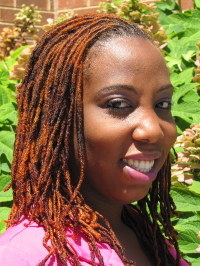2014 SRE Program Participant Profile: Tashika James

|
Hometown: Kingston, Jamaica |
Why did you apply to the SRE program?
I applied to the SRE program to gain knowledge, skills, and experience in biological and mathematical modeling. Learning and developing the skill-sets of instrumental techniques, how to interpret data, and how to evaluate and communicate scientific information will also prepare me for a future in biomedical and/or cancer research. Also, as a STEM mentor on campus, I am eager to share this knowledge and experience with my peers, the campus (specifically the Division of Mathematics and Natural Sciences), and mentees to illustrate the importance and ever-changing practices of the STEM discipline.
How did you hear about the program?
You can't live in Tennessee and not be familiar with UT - Knox! However, my interest was sparked when a graduating senior told me about his experience last summer. He mentioned how the experience was transformative academically and personally. Soon after, I researched the program and applied.
![]()
A lot of people are intimidated by SRE programs, but I strongly recommend this program because the experience is challenging, yet rewarding.
![]()
– Tashika James, SRE participant
What is the purpose of your research?
The purpose of the research is to investigate the rate of bovine respiratory syncytial virus (BRSV) transmission in a beef feedlot and to educate the farmers on when to treat the infected cattle or the entire feedlot.
What does the research ultimately accomplish? What contributions to science and/or humanity does the research ultimately make?
The research explains the dynamics of pathogen transmission through the cattle contact network. Also it provides a realistic model to investigate the disease transmission; facilitates the decrease prevalence in the BRVS virus, and improves the cattle industry.
Describe a typical day on the job.
Collectively meet with my team of researchers for at least an hour to discuss the most efficient and effective ways to progress/approach our research. Afterwards, we individually work on specific components of the project we (as individuals) are responsible for.
Tell us something about your field of study we would be surprised to know?
a. The different parts of the brain are responsible for different parts of the body.
b. An oyster changes its gender several times in a year.
Do you have an interesting "personal side" to your research experiences that will increase human interest in your story?
After visiting the farm I decided to stop eating beef.
What were your favorite parts of the SRE program?
My favorite parts of the SRE is learning about these different types of modeling analysis and getting sophisticated mathematical results that have been used in and have emerged from the life sciences. I also enjoyed the both the educational and fun activities planned for us, for example the national scholarship presentation, the graduate school panel, the visit to the zoo and the synchronizing fireflies in the great Smoky Mountains.
What new experiences did you gain that have helped you today?
Before I came to NIMBioS, I was not familiar with programming/modeling. With the lectures, discussions, and assignments, I have gained a plethora of knowledge that has allowed me (and my research team) to successfully navigate and complete our project. Additionally, being cognizant and utilizing the strengths of my fellow researchers (whether personal and/or academic) made the execution of the project and presentation easier.
What advice would you give someone who's interested in/curious about participating in the program?
I would encourage anyone who is interested in participating in this program to apply without hesitation because the experience is incomparable. As an undergraduate student, you have the opportunity to engage with fellow researchers in your field, gain mastery to important skill-sets and knowledge, and obtain hands-on experience that is needed and oftentimes, required in the discipline.
Would you recommend our program to others?
Certainly. A lot of people are intimidated by SRE programs, but I strongly recommend this program because the experience is challenging, yet rewarding. Again, this experience is beneficial academically, professionally, and personally. Participants are not simply sitting in a lab looking into microscopes. Participants are immersed in research experience and enrichment activities under the mentorship of highly qualified and knowledgeable mentors such as Dr. Suzanne Lenhart and Mrs. Kelly Turner that not only fosters academic success, but future leaders in the STEM discipline.
What do you do outside of work (hobbies, sports, associations, activities)?
Outside of work I enjoyed cooking, listening to music, volunteering and planning and attending events that uplift and inspires young people.
Where do you see yourself in 10 years?
Ten years from now, I see myself as a postdoc researching cancer epigenetics in a well-known institute. I also aspire to be the director of such institute eventually.
NIMBioS
1122 Volunteer Blvd., Suite 106
University of Tennessee
Knoxville,
TN 37996-3410
PH: (865) 974-9334
FAX: (865) 974-9461
Contact NIMBioS


